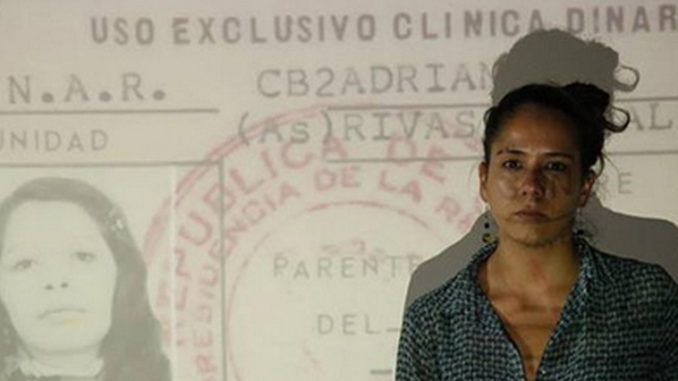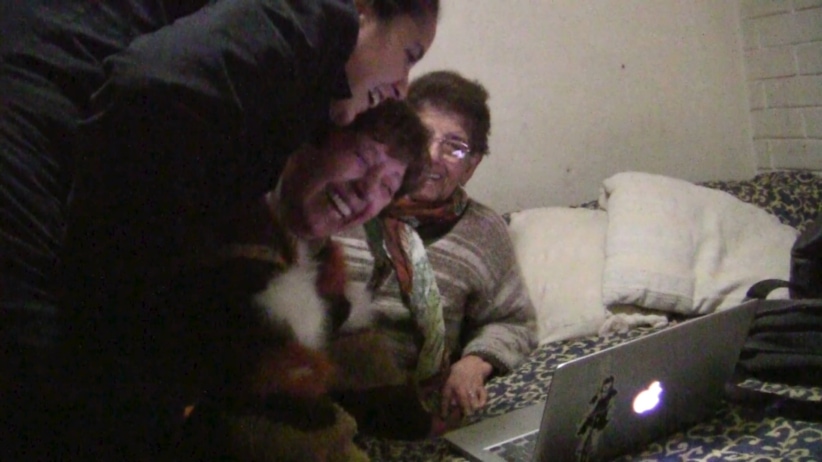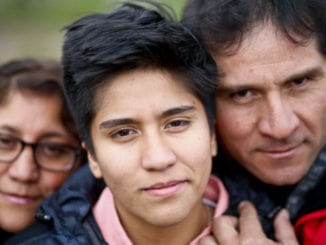
MADRID – Chilean filmmaker Lissette Orozco, who has made a name for herself in the international documentary film industry with Adriana’s Pact (2017), a film about her aunt, Adriana Elcira Rivas González, one of the female police agents of the military dictatorship of Augusto Pinochet (1973-1990), believes that her country has failed to deliver justice to the victim’s families.
“More than 40 years have passed since the dictatorship, there’s been no justice in Chile. There still exists the idea of denying what happened during those years,” says Orozco in an interview with The Santiago Times before her film’s screening at Casa América in Spain’s capital, Madrid.
She also harshly criticized the Chilean Supreme Court’s August decision to release seven high-ranking military officials, charged in 2016 with torture, death and disappearance of thousands of Pinochet’s opponents, as “extreme cruelty against the Chilean society”. “It’s terrible that they faced only four years in prison and now they will be set free and die in their homes keeping their silence about what they did”, adds the young director.

Orozco’s documentary is about the silence pact that the old regime’s military agents have been keeping about the violations of Human Rights during the 17 years of the Pinochet’s iron-fist rule. The antagonist is her own aunt, Adriana Rivas, also known as Channy among her family members.
Lissette Orozco, a baby girl in the 90s, was the apple of her aunt’s eyes. “She was my idle”, remembers the filmmaker who recalls the presents she used to receive from her whenever Channy came back from Australia, to where she had escaped following the end the dictatorship.
Her fantasy world came down to ruins after Rivas was arrested in 2007 at the Santiago airport as she was persecuted by the Chilean justice for her role in torturing and disappearance of communist dissidents, the charges she has refuted and keeps denying. “One day I saw my idle was ruined but I didn’t understand why,” says Orozco.
Adriana Rivas-1976
The dierctor’s aunt is believed to be involved in the Conferencia Street Case that took place between May and November 1976 when the Pinochet’s secret polítical police’s (DINA) extermination unit (Lautaro Brigade) raided Chile’s Communist Party safe house, located in number 1587, Conferencia Street in the capital Santiago. During the persecution, the secret police officers, allegedly including Adriana, tortured, killed and did away with the bodies of one of the party’s chiefs, Víctor Díaz, and several other members.

The case was revealed in 2007 the same year Adriana was detained and put under the house arrest as the investigation went forward. That was the moment when Orozco, who was studying filmmaking at the time, decided to record her aunt, who had turned into the talk of the town. But it wasn’t until 2011, when Adriana sneaked away to Australia, that she decided to make a film about her aunt. “At the beginning I wanted to record her so if one day something happened to my aunt, I’d have the evidence. But in 2011 I started the project because I knew I wanted to make a documentary about her. My aim was to help her come clean,” confesses the director, whose film has won more than 20 international awards including the Berlin Festival Peace Prize last year.
The movie shows Adriana cherishing her years at DINA, describing them as “the best moments” of her life. She makes her way to the system starting from the National Rehabilitation Direction (center), also known as DINAR in Spanish. For her knowledge of English, she is assigned to translate intercepted messages between the members of the Chile’s Communist Party and other communist formations around the world. Years later, she signs up to be an agent, becoming the secretary to Manuel Contreras, DINA’s head and Pinochet’s right-hand man. “Whenever she talks about those years, she describes them with beautiful words as if nothing happened”, arguments the director.
The current’s system foundations are all the same as the one that left Pinochet, including the Constitution
The Voyage
The film’s protagonist is Lissette Orozco herself, who embarks on a journey that takes her through the darkest years of her aunt’s past, concealed by her family. She feels “ashamed” of realizing that she is also part of a family, a member of which has been involved in human rights violations. Although Orozco defends it as a “protection mechanism” in the face of the allegations, she tries to distance herself from the family’s “silence”. “I didn’t want to be part of it (the silence), that’s why I decided to make this film,” she concludes.
She sets on this path by investigating old documents, pictures her own aunt shows her, Adriana’s former colleagues at DINA, talking to psychologists and lawyers as well as Javier Rebolledo, a famous Chilean journalist, whose research into the horrific events has led to unveiling many secret episodes of Pinochet’s dictatorship. The movies invites the audience to accompany Lissette in her truth-seeking journey.
Although there isn’t one decisive moment that the viewers find her aunt guilty, but it makes it clear that Adriana, a high-ranking female agent in the dictatorship, refuses to speak out. “I don’t know if my aunt took a gun, detained a person, killed them, kept the body or threw it to the ocean. I can’t make sure how dirty her hands are. But, what I discover is that she was involved in the house-to-house search. Maybe she was never involved in torture, homicide or disappearance of the bodies” declares Orozco, who afirms that her aunt “knows a lot but she never wanted to recognize anything”.
The other protagonist of this long consciousness journey is her grandmother, who she considers her mum after her biological mother left her. The grandmother, Adriana’s sister, also cherishes those years and defends Chany. “I can’t judge her because she never hurt any of my family members,” she says at the beginning. However, she is seen at the end hugging Lissette with tears in her eyes. “Her voyage is more marvellous than mine because I was born during Chile’s democracy and after receiving this information, I do justice with my film. But, my mum has right-wing political ideas and afirms it but she has now recognized what happened,” says the director. “The fact that a woman at this age – more than 70 years old –comes to such recognition, is absolutely valuable to me,” she adds.

“Generational Damage”
The director of Adriana’s Pact believes that Pinochet’s dictatorship during 17 years has not only polarized the Chilean society but also has caused a lot of harm between the generations. “There are lots of people in Chile who are still in favour of Pinochet. The moment a family decides to talk about politics, it divides into two extreme poles: pro and anti Pinochet,” asserts Orozco.
She describes the 1988-90 transition to democracy as “transaction”, arguing that “the current’s system foundations are all the same as the one that left Pinochet, including the Constitution”.
Unfortunately, the new generations are receiving distorted information
Orozco says that large sways of the Chilean society believe in right-wing politics, inherent from the dictatorship years. “A big majority of the Chileans are still pro-Pinochet because our current businessman president (Sebastian Piñera) was elected for some reason. The right-wing population is very important in Chile because they are the ones who keep privatizing industries and services. They are the Chile’s owners,” she adds.
The director, whose acclaimed documentary has been shown at more than 90 international film festivals around the world, lashes out at right-wing government efforts who try to “erase the history”. For example, she mentions Mauricio Rojas, the former Culture Minister at the current Piñera government, that was forced to resign last August after he described the country’s Memory Museum as a Communist set-up.
Orozco also recalls comments by Harald Bayer, the ex-Education Minister at the previous Piñera’s government in 2012, who suggested that the word “dictatorship” in school books be changed to “military regime”. “Unfortunately, the new generations are receiving distorted information”.
Where is Adriana Rivas?
Chany keeps living in the Australian city of Sydney although the Santiago government has requested her extradition for the fourth time this year. “My aunt is an Australian citizen, with a clean record since she started living in that country. That’s why Canberra doesn’t agree easily to her extradition,” says her niece.

Adriana has also cut ties with her family, including Lissette, after she finished the movie’s edition in 2016. “I sent her the film to watch it so we could talk. But she didn’t say anything, even didn’t answer my calls,” says the director. “One day, I received several furious voice messages from her. Can’t remember exactly what she said,” she adds.
Although, Lissette has never received any direct threats, but Orozco remembers that one of the last sentences her aunt told her from Australia was that she cautioned her to be careful whenever she leaves work. “But, I’m not afraid as I don’t live in Chile anymore,” says the 31-year-old.



